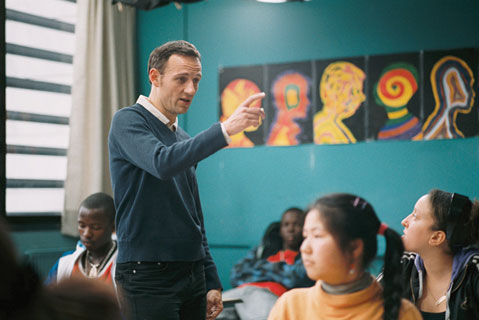The Class
Fran§ois Begaudeau stars in a film written by Begaudeau, Robin Campillo, and Laurent Cantet and directed by Cantet, based on Begaudeau's novel Entre les murs.

An unusual hybrid of documentary and fiction, The Class is set in a Parisian middle school and follows an academic year in the life of Fran§ois Marin (Fran§ois Begaudeau) and his rowdy French class-but Begaudeau (a real-life teacher) and the students are all playing versions of themselves. It may sound like a reality show, but the results here are far more authentic.
The Class eschews the narrative structure viewers would normally expect from a film like this. We learn nothing of Marin’s personal life, and the backgrounds of the students-many of them Muslim, many from immigrant families-remain suggested rather than explained. As the film follows the progress and events of Marin’s class, the action stays entirely on school grounds. (The title of the book on which the film is based is “Between the Walls.”) Though the school does look distinctly like a prison, and the limited setting gives the film a somewhat claustrophobic feel, it also works to evoke the isolation in which teachers work. Marin asks his students to write self-portraits and gets a sense of their family dynamics in parent-teacher conferences, but he understands that he still knows very little about his students.
Unlike American films on this subject, there are no real heroes or villains in this film: Marin’s dedication and compassion are obvious, but he also occasionally loses his cool and the control of his class, while even the mouthiest kids win our sympathy. After watching the antics of Marin’s students, viewers understand the emphasis some of the film’s teachers place on discipline, while the officious principal just seems to be doing the best he can.
The similarities and differences between the public educational systems in the U.S. and France are intriguing to observe, but a scene depicting a crucial faculty discussion about a disruptive student drags on too long.
The film is at its strongest in showing the everyday, often understated, drama of the students’ interactions with the educational system: the sight of super-cool Souleymane having to act as interpreter for his Malian mother at his own disciplinary hearing will haunt viewers long after the film ends.



